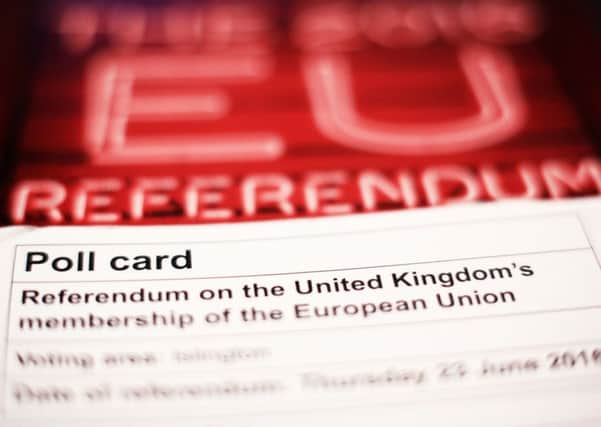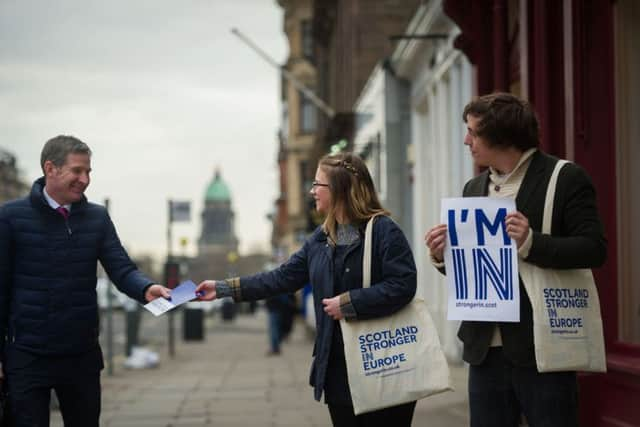Dominic Hinde: Do EU referendum voters know what they're voting for?
This article contains affiliate links. We may earn a small commission on items purchased through this article, but that does not affect our editorial judgement.


A few months ago I was sat in a meeting room in Berlin with journalists from all over the continent, discussing what we might be talking most about in the coming months and pitching ideas to one another. The UK referendum on EU membership was not high on the agenda. It was there in the diary, but there were a whole load of other newsworthy events happening. Poland was about to ban abortion, and Russia was mobilising cyber attacks against Finland and the Baltic States, the far right were about to make a serious run for the Austrian presidency and Macedonia was all but closing its border with Greece.
There were anti-corruption protests in Kosovo (against an EU-policed political settlement), and there at the end of it all was a referendum by one of the EU’s many member states on leaving the union completely. At the time it looked as if the UK vote would just be a prosaic formality.


Advertisement
Hide AdAdvertisement
Hide AdIt was also dark coincidence that our meeting coincided with the terror attacks in Brussels.
Suddenly the British media turned its head to the continent, and there was a desperate scramble for information and for copy.
Because of the EU Brussels is one of the places the UK does have correspondents, but as they trod water on air to fill minutes, it became evident they were telling a story without context.
In a complex story, audiences and anchors alike were going in cold.


News anchors and editors have always struggled with reporting Europe. The satirist Chris Morris and playwright Patrick Marber summed it up in a sketch in which Marber’s roaming correspondent Peter O’Hanrahanrahan makes up news from an EU economic summit gambling on the fact nobody will know the difference.
A colleague of mine who works for a European national broadcaster moaned at me about Europe reporting that consisted of walking towards camera followed by a soft shot of flags outside the European parliament.
His producers had actively forbidden the practice.
Though the Brussels attacks had very little to do with the EU as an organisation, they revealed an old problem. If something as big as the Brussels attacks happens then Europe becomes a talking point, but most people in Scotland could tell you more about the US Republican Party than the German Christian Democrats (CDU). Like it or not, the CDU have a far greater impact on our day to day lives than Marco Rubio or Donald Trump ever could.
Likewise, last week the parliament of Luxembourg voted against ratifying an EU-Canada trade treaty that directly impacts on the UK.
Advertisement
Hide AdAdvertisement
Hide AdIt received next to no coverage, and the treaty had barely been mentioned in the UK press at all.
The caricature of ignorant and uninformed Brexiteers is rolled out almost every day, but when Europe is only an occasional visitor in British public life who can blame them?
The EU, part of the every day lives of people across the continent in any number of ways, is massively undereported.
This is why the Vote Leave campaign could print posters claiming Turkey is joining the EU (it isn’t, and Britain could veto it anyway), but also why David Cameron could claim to have negotiated ’reform’ (the basic tenets laid out at Maastricht in 1992 remain untouched).
Leave or Remain, you can get away with saying more or less anything it seems. The complex problems of the continent and the Union are often reduced to crass generalisations.
The Scottish Government is keen to show its European enthusiasm in contrast to Westminster and Edinburgh likes to style itself as a European capital rather than as a regional seat of government in the UK.
Behind the enthusiasm though Scotland has just one European news outlet – Eorpa on BBC Alba. The tiny Eorpa team do a great job of reporting from all over the continent on a fraction of the budget allocated to their BBC Scotland and STV peers.
Turn on the television news in Scotland and if you are lucky you may get some soft shots of flags in Strasbourg.
Advertisement
Hide AdAdvertisement
Hide AdThis is one of the reasons why the EU has been reduced to a numbers game. Without any convincing understanding of what the EU is and what it does, the only thing left is to break it down into statistics, wholesale prices and the number of Ryanair flights it creates over any idea of a cohesive European project, or of what normal life is like for most Europeans.
The big question for Scots and the rest of the UK is not stay or go, but whether they are want to engage with Europe in all its messy complexity or merely keep track of it on a balance sheet.
Dominic Hinde is a European correspondent for the Scotsman and other English language newspapers.
DOWNLOAD THE SCOTSMAN APP ON ITUNES OR GOOGLE PLAY
